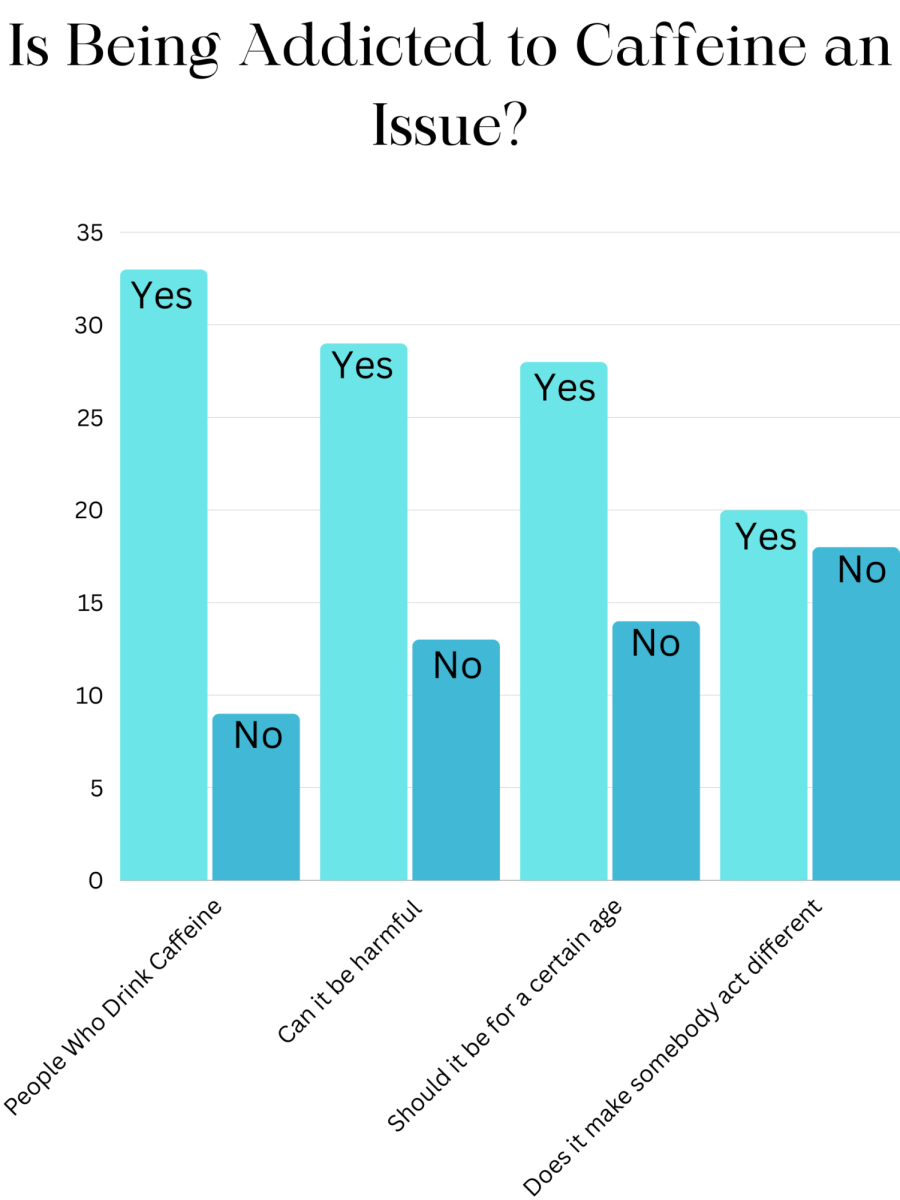According to the Dietary Guidelines, the average intake of caffeine for teenagers ranges from 63-80 milligrams a day.
A lot of people start drinking caffeine at a young age, in the form of soda.
“I first had caffeine in middle school. I started drinking it to stay awake. Now it’s to alleviate headaches and give me energy,” civics teacher Laura Brubaker said.
Having too much caffeine can have an effect on somebody’s personality.
“It can make a person very hyperactive and that could affect the people they are with because it could cause them to over do anything without realizing it. Drinking it could have a negative effect,” senior Kayla Delozier said.
Senior Emma Bechtel feels that relying on caffeine in heavy amounts is unhealthy.
“This can cause severe health issues down the road. However, this is something an individual should be made aware of, and if they choose to continue drinking caffeine, so be it. I believe this is a personal lifestyle choice that an individual needs to make on their own,” Bechtel said.
According to Advent Health, the receptors in the cells of the heart are stimulated by the caffeine which increases heart rate.
“I feel that if unchecked, it can become a major problem for those who can’t handle it,” Junior Blake Riddle said.
Having too much caffeine can cause somebody to mentally crash or shut down due to the over-abundant amount of energy given to them.
“When taken in smaller doses, I think that it makes people feel refreshed and focused. However, for individuals that consume larger amounts in a day, it overstimulates them and gives them too much energy and then they crash later,” Bechtel said.
For some people, caffeine helps them focus from the adrenaline it gives them.
“It depends on the person. Some people get super hyper, while other people it helps them focus in class so it depends how it helps that person. For me, it can sometimes help me focus, and it can sometimes make me get really shaky and unable to stop fidgeting,” senior Marina Myers said.
For senior Dominic Gena, caffeine has given him an alternative to go to for ADD [Attention Deficit Disorder] instead of the prescribed medication.
“The main drink I enjoy every morning as a pick me up is a coffee alternative called Mud/WTR. I am a fan of caffeine, and it helps me to get stuff done on a daily basis. I was diagnosed with ADD in fifth grade and have always experienced bad side effects from the prescribed medication. This made caffeine a good alternative for me,” Gena said.
Gena had been drinking caffeine daily for two years, causing him to have an addiction to caffeine.
“Caffeine wakes me up in the morning, motivates me to do the things that need done and motivates me to take steps toward self-improvement. In my freshman and sophomore year, I developed a caffeine addiction that had me drinking a Bang energy drink every day. Without doing this, I would experience extreme fatigue or a migraine,” Gena said.
Getting the extra energy from the caffeine can help with being more productive, as it awakens drinkers.
“It helps me get work done. It’s really easy to just overlook work when I’m tired so if I drink something that’ll give me an energy boost, I can be more productive,” junior Cara Bolvin said.
When Gena had realized he got addicted to drinking caffeine and he stopped drinking energy drinks daily, he noticed he wasn’t as focused as he thought he was.
“I wanted to stop depending on it so much, but this caused me withdrawal symptoms. Once I finally managed to successfully consume a healthy amount of caffeine every day, I started to realize the cognitive enhancement that caffeine was said to cause. I try to limit myself to 40 mg of caffeine per day, and I take a supplement that increases my motivation and focus so much that I achieved all 93 and above in my entire junior year and am holding that streak this year,” Gena said.
Getting addicted to caffeine can be easy when somebody drinks it on a regular basis.
“I drink three cups of coffee, but not daily. I only like it to be doctored up with lots of sugar and without that I won’t drink it. I prefer water,” Brubaker said.
According to the United Brain Association, around 90% of Americans consume caffeine regularly. About 8% of caffeine users meet the criteria for caffeine use disorder.
“Caffeine is a stimulant drug that can help you get stuff done but also causes addiction in about 10% of adults, and 90% of adults depend on it in the morning. Caffeine is shown to cause anxiety, insomnia and increased heart rate. Caffeine also stimulates the digestive system, giving lots of people bad stomach symptoms,” Gena said.
“I feel that caffeine makes people more attuned to their surroundings. I feel that my senses increase greatly, and I can function at higher and faster rates than without it. My reaction time is also much faster, although this is at a cost, because I can feel my heart rate skyrocket,” Riddle said.
When somebody drinks caffeine daily, it can affect their personality towards other people in a negative way and change the person’s mood.
“I’ll honestly never understand how some people drink coffee every single day. People just get used to having that energy and when they don’t they can be easily irritable and annoyed,” Bolvin said.









